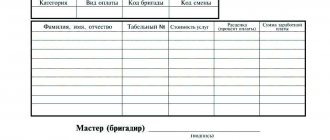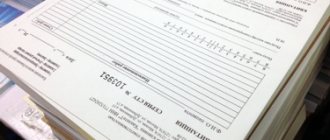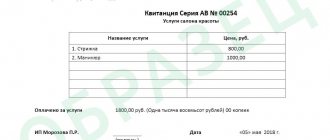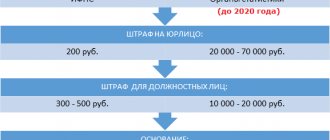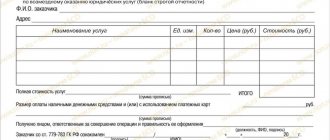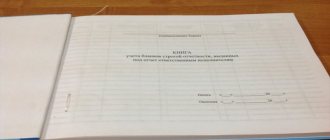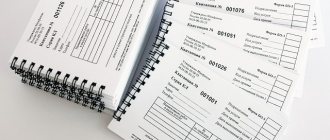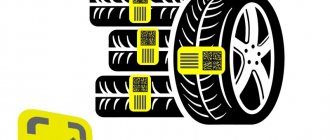Strict reporting forms today are used by many individual entrepreneurs and organizations to process cash payments when providing services to the public. BSOs allow you to save on the purchase and maintenance of cash register equipment. It is enough to print them in a printing house in compliance with the requirements set out in Resolution of the Ministry of Finance of the Russian Federation No. 359 of May 21, 2008.
Attention! The use of paper BSOs for many types of activities has been extended until July 1, 2021.
However, on July 15, 2021, a new law, Federal Law No. 54, came into force, establishing new rules for the use of cash register equipment. Key points of this law:
- all cash register equipment must transmit information about all completed transactions via the Internet to the tax office
- from July 1, 2021, everyone who previously used cash registers must replace them with new ones and connect to online data transfer
- everyone who has used the BSO can continue to do so until July 1, 2018, after which the BSO will be valid only in electronic form
Who can use BSO instead of cash register
In what situations can a strict reporting form be used instead of a cash receipt and until what date can this be done according to the old rules?
A strict reporting form (SRF) can be used to replace a cash receipt when making payments to the public for services rendered (Article 1.1 of the Law “On the Application of CCP” dated May 22, 2003 No. 54-FZ as amended by the Law “On Amendments...” dated July 3, 2016 No. 290 -FZ, clause 2 of article 2 of law No. 54-FZ until amendments are made to it). According to the updated requirements, BSO, like cash receipts, must be generated in an automated manner using online devices.
However, for persons who have not previously used cash registers (and these include those who make payments through BSO), Law No. 290-FZ, which contains the rules for the transition to the application of the updated Law No. 54-FZ, set the start date for the mandatory use of cash registers later than the total (07/01/2017) – from 07/01/2018 (clause 9 of article 7). At the same time, legal entities and individual entrepreneurs issuing BSO to customers were given a separate clause in Law No. 290-FZ (clause 8 of Article 7), and it also contained the date 07/01/2018.
However, Law No. 290-FZ has undergone an adjustment (Law “On Amendments...” dated November 27, 2017 No. 337-FZ), which resulted in a change in the text of clause 8 of Art. 7. In it, the date 07/01/2018 was replaced by the date 07/01/2019, and the text included a clarification that services performed with the registration of BSO should not be related to catering services provided by both legal entities and individual entrepreneurs with hired employees.
Thus, BSO for services for the population could be applied according to the old rules (which were in force before the update of Law No. 54-FZ by Law No. 290-FZ) until 07/01/2019.
After the specified period, entrepreneurs and organizations that can issue BSO instead of cash register checks are required to generate strict reporting forms using automated settlement systems.
Read about what other innovations have led to changes in cash register legislation in the following articles:
- “Latest changes in 54-FZ “On the use of cash register equipment””;
- “Current amendments to the law on online cash registers.”
Destruction Act
It is prohibited to simply throw away documents, even if they are damaged. Everything must be taken into account. And a monetary document is important for regulatory authorities. Therefore, in case the relevance of the strict reporting form has been lost, but at the same time it contains certain data, a special procedure is provided - destruction.
BSO write-off act
Due to the significant interest of regulatory authorities, some organizations even write explanatory notes that specify the reasons for the damage. Although this is a bit excessive. The current regulations stipulate that in the event of a problem, a write-off act is drawn up, which provides a separate field “Reason for write-off”. It must briefly indicate why the damage occurred. For example: “a mistake was made.”
The act does not have to be drawn up for one document on the day of damage. If the accounting apparatus does not get bored from work, you can accumulate forms in order to destroy them at once. In this case, it is necessary to indicate the resolution on the basis of which they act, the time period covered, the number and series of the document and the responsible persons.
Who is exempt from using CCT?
The list of cases when you can work without a cash register is exhaustive and is indicated in paragraphs. 2, 3, 5, 6 tbsp. 2 of Law No. 54-FZ. These are the situations:
- issuing (receiving) cash using automatic devices for settlements in credit institutions (including electronic means of payment);
- sales of printed media and related products, if the share of sales of printed products is at least half of the turnover, and related products correspond to the assortment list approved by the constituent entity of the Russian Federation;
- sales of securities;
- sales of tickets, coupons, travel documents giving the right to travel on public transport, in vehicle salons;
- sale of food in educational institutions;
- trade at fairs, retail bazaars, exhibitions, at specially designated areas, excluding trade in trading places equipped and ensuring the demonstration and safety of goods;
- fair trade in non-food products, the list of which is established by the Government of the Russian Federation;
- peddling trade (except for the sale of technically complex goods and food that require special storage and sale conditions) in passenger train cars, from trays and hand carts, and other small-scale mechanization equipment;
- sales of ice cream, draft soft drinks in kiosks;
- sales of kvass, milk, vegetable oil, live fish and other excise-free draft goods from tank trucks, sales of seasonal vegetables and fruits by rummage;
- acceptance of waste materials from the population, excluding scrap metal, scrap of precious metals and precious stones;
- providing shoe repair and painting services;
- providing metal repair services - making keys and small metal haberdashery;
- provision of nanny and nurse services;
- sales of handicrafts, if sales are carried out by the manufacturer himself;
- providing services for plowing gardens and cutting firewood;
- providing porterage services at train stations, ports, and airports;
- leasing of real estate (housing) from individual entrepreneurs;
- work in remote settlements, the list of which is approved by a special resolution of the Government of the Russian Federation;
- sales of medicines and medical products by medical organizations located in rural areas where there are no pharmacies, or by FAP pharmacies located in villages and towns;
- sales of goods, services and products for religious and ritual purposes by religious organizations that have the appropriate license in the places where they carry out their activities.
See also the article “Who should switch to online cash registers from July 1, 2021?”
New rules for connecting cash registers
From July 1, 2021, all cash registers must have the technical ability to transmit information via the Internet to the tax office. Information is transmitted not directly, but through a special organization - a fiscal data operator (FDO). A list of operators can be found on the FSN website.
Moreover, not only retail stores, but also all online stores that previously could use the services of various payment systems that provide settlements with customers should connect. Now the organization or individual entrepreneur that owns the online store must issue cash receipts.
Cash receipts themselves have become an electronic document that is sent to the client’s email and/or printed.
Postings in organizations using BSO for calculations
If an organization uses a strict reporting form instead of a cash receipt, then such a form must be stored and accounted for according to the rules established by Decree of the Government of the Russian Federation dated May 6, 2008 No. 359. Strict reporting forms are kept in the appropriate journal (stitched and numbered). To control the movement of such material assets, an accounting card is created.
Typical transactions when using BSO in an organization are as follows:
| Debit | Credit | The essence of the operation |
| 10 | 60 | Purchase from the BSO printing house, posting them to the organization |
| 19 | 60 | VAT has been allocated from the amount of purchased forms |
| 68 (VAT) | 19 | Value added tax on purchased forms is accepted for deduction |
| 20 | 10 | BSO were transferred to the relevant units or financially responsible persons |
In addition, BSO are reflected on the balance sheet in account 006. Its use allows you to keep track of the receipt and write-off of forms by departments and financially responsible persons (MRP). Thus, the debit of account 006 reflects the receipt of forms to the corresponding department and to a certain MOL. According to the credit of account 006, strict reporting forms are written off from the unit or MOL upon their disposal (use, damage).
The identified shortage is documented in an act drawn up by an authorized commission. The write-off of BSO in case of damage is also carried out by an act.
BSO is stored in safes or fireproof cabinets designed for storing such documents. BSO inventory is carried out regularly (at least once a year).
Read more about accounting and inventory of BSO in the article “What applies to strict reporting forms (requirements)?” .
Requirements for filling
It is necessary to write out the BSO in accordance with a number of rules so that the regulatory authorities recognize the document as correct:
- When filling out the bank, you need to simultaneously take care of the design and its copy in the amount of at least 1 copy. An alternative is considered acceptable when a tear-off part is provided. It is mandatory for her to repeat all the details of the main part. This is important because both the entrepreneur and the recipient of the service must have a document confirming the transaction.
- Forms must be filled out either at the time the organization/individual entrepreneur receives money, or after payment has been made by payment card. It is prohibited to draw up a document earlier, as well as later, even if the delay is only one day.
- All BSOs must be clearly documented and must not contain errors or corrections. If there is a blot or corrections need to be made, then the incorrectly completed document will be crossed out. But since everything must be taken into account, information about the incident is entered into the Book of Forms on the day of damage. Then the new document is filled out correctly.
- It is prohibited to throw away a damaged form.
- All documents completed during the day are summarized, and a cash receipt order is drawn up for their full amount, if they are carried out as part of business activities.
- The forms are filled out either by the individual entrepreneur himself, or (relevant for the organization) by the person responsible for storing, recording and issuing BSO.
Instead of BSO - POS terminal
Operations for carrying out payment transactions through a POS terminal are subject to the Law “On activities for accepting payments from individuals carried out by payment agents” dated 06/03/2009 No. 103-FZ. Note that POS terminals include devices that allow you to use bank cards when paying for purchases.
If payment is made using a POS terminal, then a strict reporting form does not need to be issued instead of a cash receipt if the terminal is connected to a cash register that generates a receipt. If equipment is used that does not generate a cash receipt, then a BSO is issued.
More information about postings when using POS terminals at an enterprise can be found in the article “Posting debit 57 credit 57 (nuances)” .
When using a POS terminal by taxpayers specified in clause 8 of Art. 7 of Law No. 290-FZ provide buyers with BSO generated by cash register or an automatic payment system in the form used by such a taxpayer before the entry into force of Law No. 290-FZ (or printed forms approved by the accounting policy of the enterprise or (for some cases) by law).
Results
For organizations and entrepreneurs that provide services to the public and issue strict reporting forms when making payments to them instead of a cash receipt, a special deadline has been set for the transition to the mandatory use of online devices - 07/01/2019. Before this date, they have the right to issue BSO according to the old rules.
Sources:
- Federal Law of May 22, 2003 N 54-FZ “On the use of cash register equipment when making payments in the Russian Federation”
- Decree of the Government of the Russian Federation of May 6, 2008 N 359
- Federal Law of June 3, 2009 N 103-FZ “On the activities of accepting payments from individuals carried out by payment agents”
You can find more complete information on the topic in ConsultantPlus. Free trial access to the system for 2 days.
What is it: strict reporting form
Let's start with a definition. A strict reporting form is a document that is used to confirm receipt of funds as payment. It is used as a replacement for a cash receipt. The BSO is recognized as the primary document with all the ensuing consequences and the corresponding attitude.
Accounting reflects the state of the enterprise
